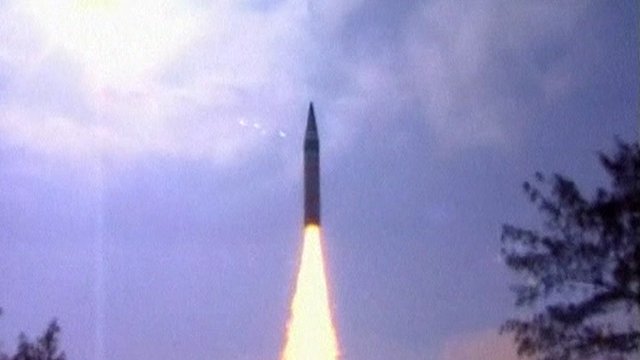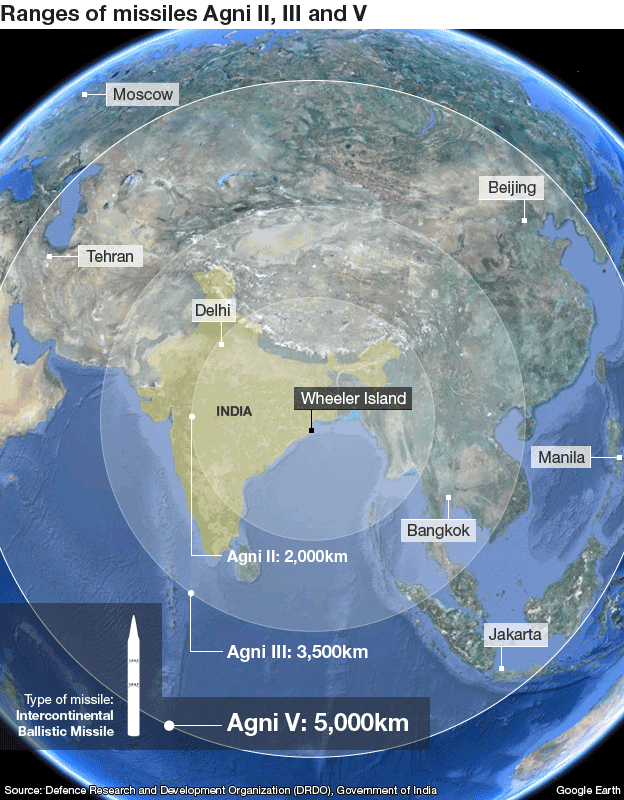BabuK
JF-Expert Member
- Jul 30, 2008
- 1,845
- 329

India has successfully launched a long-range intercontinental ballistic missile able to carry a nuclear warhead, officials say.
The Agni-V was launched from a site off India's east coast and took about 20 minutes to hit its target somewhere near Indonesia in the Indian Ocean.
The missile has a range of more than 5,000km (3,100 miles), potentially bringing targets in China within range.
India said the launch was "flawless" and the missile had reached its target.
"The ships located in mid-range and at the target point have tracked the vehicle [missile] and witnessed the final event," Defence Research and Development Organisation (DRDO) spokesman Ravi Gupta said.
With this, India joins an elite nuclear club of China, Russia, France, the US and UK which already have long-range missiles, although with a much greater range. Israel is also thought to possess them.
"It was a perfect launch. It met all the test parameters and hit its pre-determined target," SP Das, director of the test range, told the BBC.
Indian Prime Minister Manmohan Singh congratulated the scientists for the "successful launch" of the missile. It was launched from Wheeler Island off the coast of the eastern state of Orissa at 0807 local time (0237GMT) on Thursday.
"Today's launch represents another milestone in our quest for our security, preparedness and to explore the frontiers of science," Mr Singh said.
'Historic moment'The BBC's Andrew North in Delhi says Indian officials deny it, but everyone believes the missile is mainly aimed at deterring China.
Continue reading the main story[h=2]Analysis[/h]

With the launch of locally-developed Agni-V, India has joined a small group of countries - up to now only the nuclear-armed powers - with inter-continental range ballistic missiles.
A successful test flight of the missile will strengthen India's nuclear deterrence once it comes into service by 2014-15.
With a range of more than 5,000km (3,100 miles), the Agni-V is capable of delivering a single 1.5-ton warhead deep inside nuclear rival China's territory.
A spokesman for China's Foreign Ministry, Liu Weimin, said his country was not threatened by the test.
"China and India are large developing nations. We are not competitors but partners," he said.
"We believe that both sides should cherish the hard-won good state of affairs at present, and work hard to uphold friendly strategic co-operation to promote joint development and make positive contributions towards maintaining peace and stability in the region."
Earlier, the state-owned China Central Television (CCTV) said the test was "a historic moment for India and it shows that India has joined the club of the countries that own ballistic missiles", Associated Press reported.
CCTV listed some of the missile's shortcomings and said "it does not pose a threat in reality".
But the Agni-V will now in theory allow India to fire nuclear warheads at Beijing and Shanghai, defence analysts say.
It was only launched once officials were sure they had the best weather conditions - so this was as much a demonstration as a real test, to show India's rivals that it has this kind of capability, our correspondent says.
"Agni-V is to meet our present-day threat perceptions, which are determined by our defence forces and other agencies," DRDO spokesman Ravi Gupta told AFP news agency ahead of the launch.
"This is a deterrent to avoid wars and it is not country-specific," he said.
Analysts say the Agni (meaning "fire" in Hindi and Sanskrit) missile family is to be the cornerstone of India's missile-based nuclear deterrent.
The Agni-V is 17.5m tall, solid-fuelled, has three stages and a launch weight of 50 tons. It has cost more than 2.5bn rupees ($480m; £307m) to develop.
The missiles are among the country's most sophisticated weapons.
In 2010, India successfully test-fired Agni-II, an intermediate-range ballistic missile with a range of more than 2,000km (1,250 miles).
